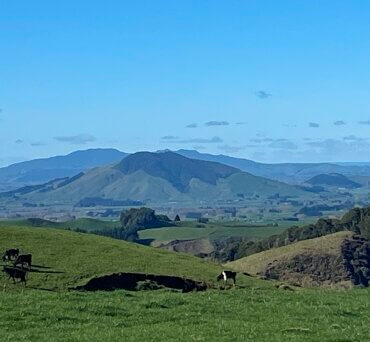
Waikato farmland
Government regulations are slowing the pine conversion trend in rural New Zealand, while dairy, kiwifruit, and lifestyle properties are seeing renewed interest from local buyers and urban escapees. Jon Rawlinson reports.
Holding the line: while dairy dominates in the Waikato, cattle may hold the line against pine in the King Country, real estate stats suggest.
Recently introduced government regulations appear to be curbing large-scale farm conversions to forestry, according to REINZ rural spokesperson Shane O’Brien.

Shane O’Brien
“We’ve already noticed less demand for forestry land, mainly due to tighter government rules,” he says.
“It’s become a bit of a hot potato, and buyers are being very cautious.”
Concerns have been mounting – especially in sheep and beef regions – that too much productive farmland is being lost to pine.
While forestry has its benefits, pine plantations don’t contribute to local communities in the same way traditional farms do.
In response, the government introduced new rules earlier this year.
“A lot of farmers have felt forestry was destroying communities and no one really likes forest next door because of animals, such as pigs, wandering out and causing damage, as well as an added fire risk and because weeds aren’t being controlled.”
While pine may be losing favour, the outlook for dairy is optimistic.
“(Recent stats show) the dairy industry is clearly going well and existing operators are looking to take the opportunity from good milk payouts and lower interest rates to further develop their farms,” O’Brien says.
“As Waikato has a strong dairy infrastructure and base, a lot of the interest in buying dairy farms is predominantly local. So, mostly, it’s coming from farmers who are growing their businesses.”

Bay of Plenty growers are set to gain if orchard sales pick up.
In the Bay of Plenty, kiwifruit remains the top pick among buyers.
“The REINZ statistics show that the biggest part of the rural real estate market in the Bay of Plenty is still horticulture,” O’Brien says.
“Compared to 12 months ago, there’s more positivity in the horticultural sector. It’s been tough going for avocado growers, and I don’t think that’s going to change quickly, but kiwifruit is still strong.”
As for lifestyle properties, Auckland’s tightening land-use policies appear to be fuelling demand further afield.
With the Supercity aiming to protect prime farmland while increasing housing supply, lifestyle blocks have become harder to find.
This appears to have fed added interest in lifestyle property in Waikato and the Bay of Plenty.
“Yes, there is more demand for lifestyle property in these areas,” O’Brien says.
“Waikato’s far more accessible now due to the expressway. Post-Covid, more people are working from home and the idea of living in the country has become more attractive and practical.
“So, we’re expecting the lifestyle market to remain pretty positive and active in these regions overall as well.”

Rural communities with their schools and infrastructure needs rely on people, not trees. Photo: Mary Anne Gill









